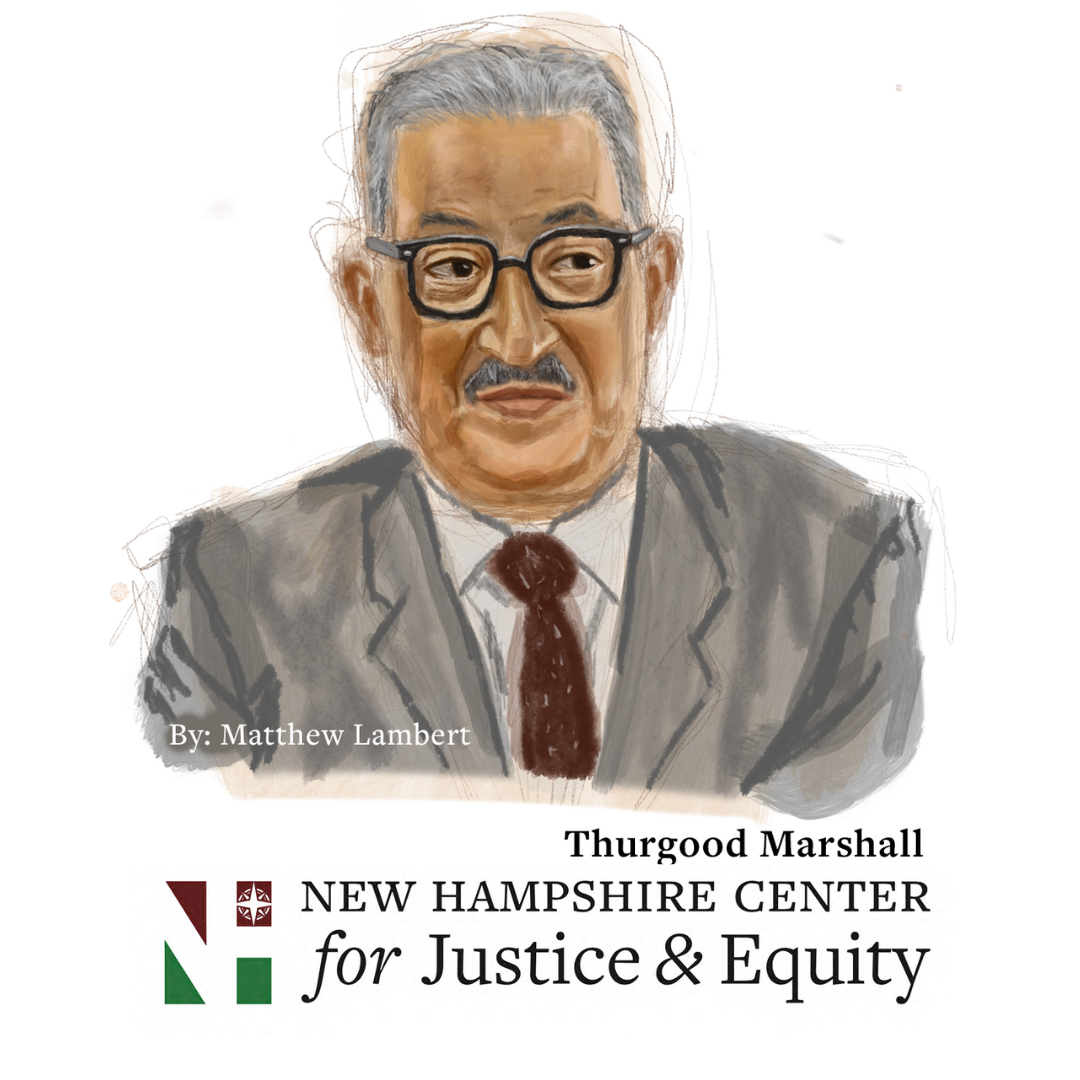Thurgood Marshall: Mr. Civil Rights’ Impact on American Justice
In our Icon Series, we reflect upon individuals who have laid the foundation for our journey toward justice and equity. The New Hampshire Center for Justice & Equity celebrates the extraordinary life of Thurgood Marshall.
Portrait of Thurgood Marshall.
About Thurgood Marshall
Thurgood Marshall was the first Black Supreme Court Justice and a pioneering civil rights advocate. He played a crucial role in landmark cases, including Brown v. Board of Education, which ruled school segregation unconstitutional. Marshall also served as NAACP’s legal counsel, arguing cases to combat racial discrimination and promote social justice. Appointed to the Supreme Court in 1967, he championed racial equality affirmative action, demonstrating the importance of using the law as a tool for change.
Rising Above Segregation
Thurgood Marshall was born on July 2, 1908, in Baltimore to a modest working-class family. His father, a railroad porter, is credited as a role model who taught Marshall to stand up for himself. While attending Baltimore’s Frederick Douglass High School, a prank landed Marshall the punishment of reading the U.S. Constitution, which made him aware of the racial injustices of Jim Crow America and eager to enact change. Marshall’s experiences with discrimination growing up in a segregated city fuelled his academic success, which earned him a scholarship to Lincoln University in Pennsylvania, the oldest African-American university in the country.
There, Marshall became a member of the first Black fraternity, Alpha Phi Alpha Fraternity, Inc. before graduating with a Bachelor of Arts in 1930. Seeking to continue his education, Marshall applied to the University of Maryland School of Law in his hometown but was rejected due to its segregation policy. He later attended Howard University School of Law, where he graduated top of his class in 1933. During his time at Howard University, Marshall met Charles Hamilton Houston, who would lead the National Association for the Advancement of Colored People (NAACP) Legal Defense and Education Fund starting in 1935.
Laying the Legal Groundwork for Change
Marshall’s earlier rejection from law school based on race reinforced the inherent injustice of the “separate but equal” doctrine. By 1936, he had established a private practice and joined the NAACP as a legal counsel. Mentored by Houston, he went on to represent Donald Murray, who sued the University of Maryland for its racist admission policy and won.
In 1940, Marshall was named chief of the NAACP Legal Defense and Educational Fund and became one of the nation's leading attorneys, winning 29 of 32 cases argued before the U.S. Supreme Court. His legal precedents set the stage for other victories against discriminatory laws, including the historic case Brown v. Board of Education (1954). The ruling declared state laws establishing separate public schools for Black students unconstitutional, and Marshall succeeded in dismantling the legal basis for segregated education in the United States.
“Where you see wrong or inequality or injustice, speak out, because this is your country. This is your democracy. Make it. Protect it. Pass it on.”
A Trailblazer on the Supreme Court Bench
Marshall continued to take on cases defending civil rights and in 1961, President John F. Kennedy appointed him to the U.S. Court of Appeals. Four years later in 1965 when President Lyndon B. Johnson appointed him Solicitor General, Marshall became the first African-American to hold that office. In 1967, Marshall once again broke barriers, becoming the first Black Supreme Court Justice in the United States, following another nomination from President Johnson.
During his tenure, Marshall consistently advocated for civil rights, affirmative action, individual liberties, and reproductive rights. He also felt strongly against the death penalty and sought to limit harsh criminal punishment. Additionally, Marshall emphasized the need for the law to protect the marginalized and underserved, influencing decisions that shaped American society. His opinions reflected a deep commitment to advancing equity and his judicial philosophy was rooted in the belief that the law should be a tool for social progress.
A Voice for Justice and Civil Rights
After 25 years of service on the Supreme Court, Thurgood Marshall retired in 1991 due to health concerns. His mission of justice for all gave him the nickname “Mr. Civil Rights” and his tireless advocacy and legal brilliance paved the way for future generations of judicial activism. His work reminds us all of the importance of standing up against injustice in all its forms.
Thurgood Marshall passed away in 1993, leaving a legacy that extends well beyond the courtroom. He was the second justice to ever be given the homage of having his flag-draped casket laid in the Great Hall of the Supreme Court.
The New Hampshire Center for Justice & Equity gives thanks and honors Thurgood Marshall for his unwavering commitment to justice and equality. As a brilliant legal mind and tireless racial justice advocate, he played a pivotal role in dismantling segregation and advancing civil rights in America. His landmark legal victories shattered barriers and paved the way for a more just society. Marshall's legacy inspires our ongoing fight for a world where all individuals are treated with dignity and respect, regardless of race, identity, or background.
Who is your icon? We are collecting suggestions for the next series of NHCJE Icons. Let us know who you would honor. Click the button below and leave the name of your nominee.
Learn More About Thurgood Marshall
https://www.tmcf.org/about-us/who-we-are/justice-thurgood-marshall/ – Thurgood Marshall College Fund
https://www.oyez.org/justices/thurgood_marshall – Oyez.org
https://www.uscourts.gov/educational-resources/educational-activities/justice-thurgood-marshall-profile-brown-v-board – United States Courts
https://naacp.org/find-resources/history-explained/civil-rights-leaders/thurgood-marshall – NAACP


